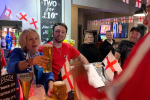Monday 24th January I know I’m going to have a busy week in Parliament with oral questions and a Select Committee hearing, but I have barely set foot in the office when I hear that an Urgent Question has been tabled.
Tabling an Urgent Question is one of the ways an MP can raise an issue in the House of Commons. The MP must submit the question at least two hours before the House is due to meet. The Speaker of the Commons then makes a decision on whether the issue is sufficiently urgent and with enough public interest for it be added to the agenda for the day.
If the Speaker does grant the question, then a Minister from the relevant department will be called to the Commons to answer the question. This sounds simple but actually the Minister doesn’t just need to answer the first question, they are also required to answer any follow up questions MPs may have on the subject. In practice this means that the Minister usually has around 90 minutes to prepare before answering quick fire questions for around an hour.
In the Foreign Office ministers are often travelling, so we always make sure that at least one of us is in London and on duty. Therefore, as Duty Minister I head over to the House to answer questions about the terrible tsunami that has hit Tonga. It has caused massive devastation. Tonga is a Commonwealth friend, another rugby loving nation and a vulnerable small island state. Since the waves hit, the UK has been working with New Zealand and Australia to help support the country. The UK has sent equipment that the Tonga government has requested including tents and wheelbarrows. A Royal Navy ship is on its way with water, PPE and first aid kits.
After the question I head back into the office to meet with the team working on vaccines in Africa, and to prepare for the sessions ahead.
Tuesday 25th January Early morning meeting with the Rwandan Foreign Secretary, they are looking forward to hosting the Commonwealth Heads of Government meeting this year. It will be such an important time to bring together leaders from across the globe. Then off to the Commons to answer Oral Questions – this time there are five Ministers at the Dispatch Box, and the hour flies by.
In the afternoon I meet with HRH, The Countess of Wessex. She is an incredible woman, who has been championing work to try to end sexual violence in conflict. We talk for ages about the women she has met across the world, and how to make progress. Sadly, Covid has brought increased sexual violence in many countries. The UK believes that where rape is used as a weapon of war, this should be considered an international war crime, on a level with the use of chemical weapons and land mines. We will be hosting an international conference later this year to try to make progress.
Wednesday 26th January I spend the morning being questioned by the House of Lords Select Committee for International Relations and Defence on our work across Africa, before heading to Parliament for Prime Minsters Questions. Annoyingly, the stomach bug that I picked up whilst travelling last week appears to be getting worse and I spend the afternoon at the London School of Tropical Medicine. They are incredibly kind and do lots of tests to try to find out what is wrong.
Thursday 27th January I spend the day in the Foreign Office, meeting MPs and peers from an All Party Parliamentary Group and working through plans for the year ahead. I meet a UK doctor whose brother, also a doctor died in South Sudan. The family don’t believe the death has ever been properly explained and we discuss ways to help them.
Friday 28th January My Chelmsford day is spent online from the House of Commons as I am Duty Minister again. The first meeting is with Essex County Council to discuss council tax. There has been a very large increase in the number of elderly people needing social care, and the costs of providing that care is increasing now that the minimum wage is going up. This means that the Council is having to increase tax. I am concerned about the impact of this for those on lower incomes, and we discuss other ways to support those who are struggling financially.
I meet with the Head of our local NHS Integrated Care System. This organisation brings together our local hospitals, GP networks and all those providing NHS services locally. The vaccine rollout has been extremely successful and covid cases in hospitals are reducing. But there are still long backlogs for other medical treatments and huge pressures on our GPs. I also raise my concerns over children not being able to access speech and language treatment, this is so important for their development and their futures.
Students from KEGS interview me for the school magazine. Its excellent news that the school has yet again been given an Outstanding rating from Ofsted, especially after all the struggles in the past two years. I join Essex Cricket Board Members for a lengthy board meeting.
Its evening time when the doctor calls me back with the results from the hospital tests. When he explains the various tummy bugs I have picked up, I realise it’s no surprise I feel so unwell. I will start antibiotics in the morning. Thank goodness for our NHS.
